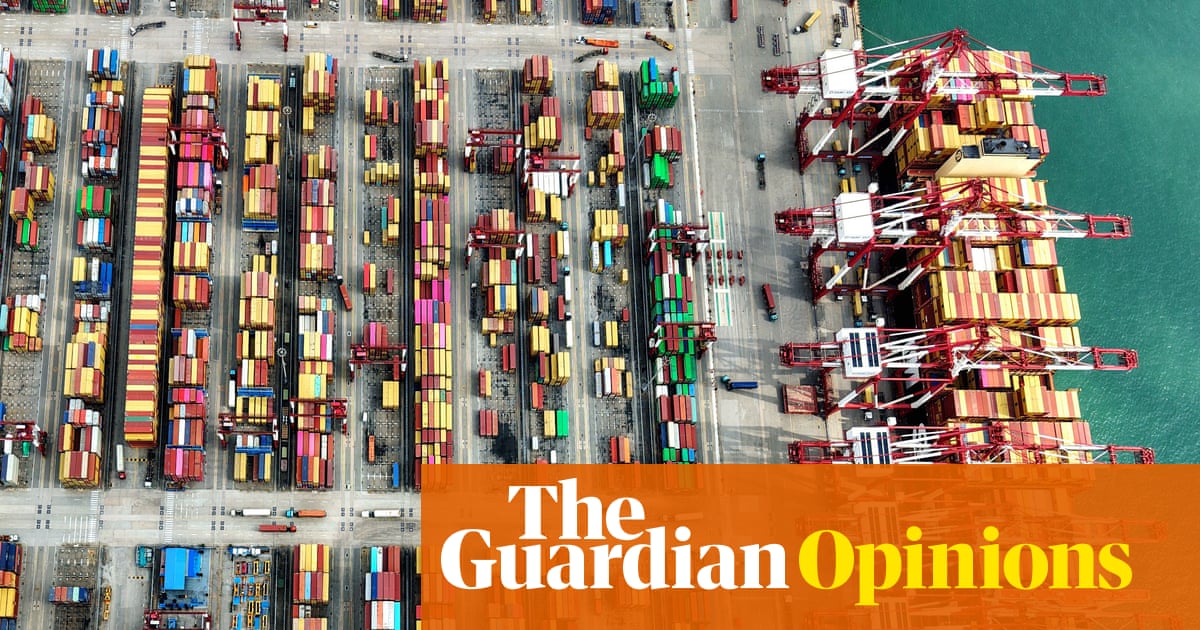Apple released iOS 26 on Sept. 15, and the update brought a new Liquid Glass redesign, call screening and many hidden features to your iPhone. But when Apple released iOS 18 in 2024, it brought a simple change to Photos to make it easy…

Apple released iOS 26 on Sept. 15, and the update brought a new Liquid Glass redesign, call screening and many hidden features to your iPhone. But when Apple released iOS 18 in 2024, it brought a simple change to Photos to make it easy…

The home loss to USF, the road losses at No. 3 LSU and No. 4 Miami, were all gut punches to a squad many considered…

Little more than 48 hours passed last week between a warning from the IMF chief, Kristalina Georgieva, that “uncertainty is the new normal” and Donald Trump’s latest tariff onslaught – this time aimed at China.
Markets plunged on Friday after Trump threatened to levy punitive additional tariffs of 100% on Chinese goods in retaliation for Beijing’s blocks on exports of rare earth minerals.
The world’s finance ministers and central bankers will meet in Washington this week for the annual meetings of the IMF and World Bank.
In her curtain-raiser speech for the gathering, Georgieva rightly pointed out the global economy has proved more resilient than some feared at the time of the spring meetings in April, when the world’s policymakers were transfixed by the chaos emanating from the White House.
Part of the reason for that has been “front loading”: Trump’s intention to jack up tariffs was no secret, and many companies ran up inventories in advance and started to rejig their supply chains.
Another explanation is that the US’s trading partners have in general preferred to use a combination of flattery and capitulation in the face of Trump’s approach, rather than causing an all-out trade war.
Meanwhile, firms and governments have increasingly been forging new trade connections that bypass the US, creating what Adam Posen, the director of the Washington-based Peterson Institute for International Economics, has called a “new economic geography”.
There was evidence of this in the latest update from the UN’s trade and development arm, Unctad, last week.
“Trade growth remained positive in the first half of 2025, despite rising trade policy uncertainty, persistent geopolitical tensions and a challenging global economic environment,” Unctad reported.
Far from grinding to a halt, global trade expanded by more than $500bn (£375bn) in the first half of the year and was expected to continue growing in the third quarter, with much of the momentum coming from developing countries.
Adding to the sense of shifting tectonic plates, Unctad highlighted the continued prevalence of “friendshoring” – the phrase coined by the former Federal Reserve governor Janet Yellen to describe trading with trusted geopolitical allies.
The impact of tariffs on the US economy also appears to have been less dramatic than first feared – though with policy continuing to change by the week, the full effects have likely not yet reached American consumers.
Yet Friday’s furore was a reminder that, as Georgieva argued, there are still reasons to be fearful – or as she put it: “Global resilience has not yet been fully tested. And there are worrying signs the test may come.”
As the new row with China shows, Trump is continuing to wield tariffs as a weapon, creating fresh shocks in financial markets. The impact has been especially tough in developing countries, some of which, as Unctad pointed out, have faced some of the highest tariffs.
Away from trade policy, the White House continues to pursue unfunded tax cuts and trash the economic institutions usually considered the cornerstones of credibility – including the Federal Reserve.
Over time, that must surely undermine market confidence, including in US Treasuries (government bonds) – an important benchmark against which assets in global markets are valued. There is little sign of that yet; but once lost, economic credibility is hard to rebuild.
Part of the reason markets have not responded more skittishly to this and other concerns is that the economic picture is being flattered by another extraordinary and unpredictable phenomenon: the AI boom.
after newsletter promotion
That amounts to another reason to worry. A wall of funding continues to pour into the tech industry as investors bet on the future of generative AI and battle to build the massive datacentres required to train and run the models.
Data from the World Trade Organization last week showed that a full 20% of the growth in global goods trade in the first half of the year was accounted for by “AI-related goods – including semiconductors, servers, and telecommunications equipment”, much of it flowing from Asia to the US.
As Ben May of Oxford Economics said recently: “The surge in US capital spending to develop AI capability has been masking weakness in other parts of the domestic economy.”
However, a growing number of observers have begun to fret that generative AI may not deliver the extraordinary gains that would justify Wall Street valuations of the tech companies.
And the increasingly complex web of cross-shareholdings between some of the key firms involved has raised eyebrows.
The Bank of England last week became the latest body to warn about the risk of a “sudden correction” in global markets if the AI boom goes into reverse.
“On a number of measures, equity market valuations appear stretched, particularly for technology companies focused on artificial intelligence. This … leaves equity markets particularly exposed should expectations around the impact of AI become less optimistic,” it said.
Georgieva echoed that caution, comparing the AI boom to the dotcom bubble around the turn of the millennium. “Today’s valuations are heading toward levels we saw during the bullishness about the internet 25 years ago,” she warned, raising the spectre of a “sharp correction”.
The dollar and dollar-denominated assets remain the lifeblood of much of global finance, despite efforts since the financial crisis to build up the importance of other currencies – so an AI crash would reverberate worldwide.
Perhaps it is fitting that Trump has unleashed a new round of destabilising threats just as policymakers fly into town to take the temperature of the world economy. It certainly drove home Georgieva’s central message to them: “Buckle up.”

The first beta release of the FreeBSD 15 operating system is now available for testing.
Following last week’s extra alpha release, FreeBSD 15.0 Beta 1 was announced overnight in the latest weekly snapshot for working toward this BSD operating…

LONDON (AP) — British police have arrested two men on suspicion of murder after the former Lostprophets singer Ian Watkins was stabbed to death at a prison in northern England, where he was serving a 29-year sentence for child sex offenses.
Continue Reading

What used to be a last resort is now becoming a power move: high-paying men are outsourcing their love lives.
A growing number of high-net-worth male professionals are ditching dating apps and turning to luxury matchmaking services, spending tens of thousands of dollars to find a serious partner.
Frustrated by ghosting, burnout, and superficial matches, some are opting for curated introductions, even if it means paying $20,000 or more for the right match.
Grant Miller, a 39-year-old VFX executive, gave dating apps another try after a breakup last year — and quickly remembered why he hated them.
“I was on Raya and Tinder, and you’d think the experience would be better on Raya — but it’s not. It’s just the same,” he told Business Insider. “An enormous waste of time and energy.”
Years earlier, he’d met a serious partner through a matchmaking service in Los Angeles.
The relationship lasted over three years and convinced him to try again. After interviewing three firms, Miller chose Maclynn, a luxury matchmaking agency based in London, where he now lives.
Courtesy of Grant Miller
Since signing up in September 2024, he said he has paid about £20,000, or about $26,000, and been introduced to 16 women through the service.
“We took a very ‘open’ approach as I was available and enjoyed meeting new people,” he said, adding that some dates turned into short relationships or friendships.
One connection, he added, has long-term potential — but “our schedules and lifestyles need some alignment, which has been challenging.”
Still, he’s said it’s worth it.
“When you multiply the time you’d spend dating by your hourly rate, the fees suddenly become not so bad,” he said. “I value my time, and I’m serious about finding the right person.”
While most clients prefer to stay anonymous, four matchmaking firms told BI they’re seeing a clear increase in demand from HNW men.
Selective Search, a US-based firm, said it’s seen a 35% increase in clients since 2019 and a 65% jump in inquiries. According to marketing specialist Grace Urban, that momentum is accelerating in 2025, with a 23% rise in male clients year-to-date.
“This steady demand has been driven by high-quality men seeking a more intentional and effective way to date,” she said.
Maclynn, the agency Miller chose, reported double-digit year-on-year growth in its HNW male client base every year since 2020.
“This reflects a nearly fivefold increase in just five years,” said Mia Wealthall, the company’s global operations director. By the end of September, 70% of new clients were HNW men, and sign-ups for that group were up 25% year-over-year for the third quarter.
Matchmaking.com also reported a 60% client surge between 2020 and 2021, followed by 25% growth in both 2022 and 2023 and another 20% increase over 2024 to 2025.
“More high-earning men are stepping away from the noise of dating apps,” said Cheryl Maida, the firm’s director of matchmaking. “They’re tired of endless conversations that go nowhere, ghosting, and not knowing who’s actually serious.”
UK-based Ignite Dating said male inquiries are up 42% over the past 18 months.
The industry as a whole is booming. According to Verified Market Research, the premium matchmaking market is projected to nearly double, from $1.27 billion in 2023 to $2.39 billion by 2032.
For Miller, the appeal of matchmaking isn’t just about convenience — it’s about increasing his chances of finding someone exceptional.
“You start doing percentages of percentages of percentages. And you’re down to like one in a hundred thousand women,” he said. “And I’m not going to meet a hundred women on my own.”
What matters most to Miller is ambition and emotional alignment.
“Financial success doesn’t always translate to romantic success,” he said. “It kind of narrows the dating pool if you’re looking for someone who’s not intimidated or overly motivated by wealth.”
Courtesy of Grant Miller
Matchmaking helps with that, he said. “I think they’re very good at sniffing out — for lack of a better word — just the kind of ‘gold digger.’ I’m looking for someone who’s additive to my life. And who’s bringing their own value to the equation.”
Unlike dating apps, which rely on algorithms and swipes, high-end matchmaking is slow, high-touch, and personalized.
Clients often start with a two-to-three-hour interview, exploring their values, past relationships, and goals.
“They really get into the interview process a ton,” said Miller. “I spent probably an hour or two just chatting through previous relationships, what went well, what went poorly, what I’m working on as a person.”
Matchmakers begin sourcing matches — sometimes via internal networks, sometimes by headhunting. At Maclynn, high-net-worth clients often trigger global searches and discreet outreach.
Matches come with bios, photos, and backgrounds. Miller said the contrast with apps is stark: “You’re kind of meeting, not an actual person, but this hyped-up kind of fake representation of themselves.”
Hinge, Raya, and Tinder didn’t respond to Business Insider’s requests for comment.
Jess Carbino, a former sociologist for Tinder and Bumble, told BI the rise of luxury matchmaking isn’t necessarily about rejecting dating apps — but about control.
“This isn’t necessarily a reflection of dating apps generally, but rather shifts related to how people outsource what used to be a very personal, familial, and institutionally-based process,” she said.
“They outsource their laundry, they outsource their food delivery, they outsource, you know, major parts of their fitness to a coach,” she added. “Why not outsource one other element of their life, which is highly salient?”
Pepper Schwartz, a professor of sociology at the University of Washington and coauthor of “Relationship Rx: Prescriptions for Lasting Love and Deeper Connection,” concurred — but added that many wealthy men believe price equals results.
“The idea that money will buy you a better product, a better treat, a better person,” she said. “Whether that is true or not, that’s the theory that many of them have.”
She warned the matchmaker pool may be smaller than clients realize: “They usually believe there’s more denominator available than is actually there, and they haven’t done the homework to know.”
Even so, she said, the pressure to partner up later in life is real — and high-end matchmaking offers the illusion of control in what can feel like a high-stakes search.
“You may hope that something will just happen for you,” she said, “but if you really want love, you’ve got to get out there and look for it.”

Earth is lucky to have a magnetic field that shields the planet — and everything living on it — from dangerous cosmic radiation. Without this invisible barrier, Earth would be exposed to the same constant stream of charged particles that…

Earth is lucky to have a magnetic field that shields the planet — and everything living on it — from dangerous cosmic radiation. Without this invisible barrier, Earth would be exposed to the same constant stream of charged particles that…

George Russell is in the form of his life. The Briton won his second race of the season and fifth of his career with a sublime conversion of pole position last time out in Singapore and sits in fourth in the Drivers’ Standings, only 99 points off…